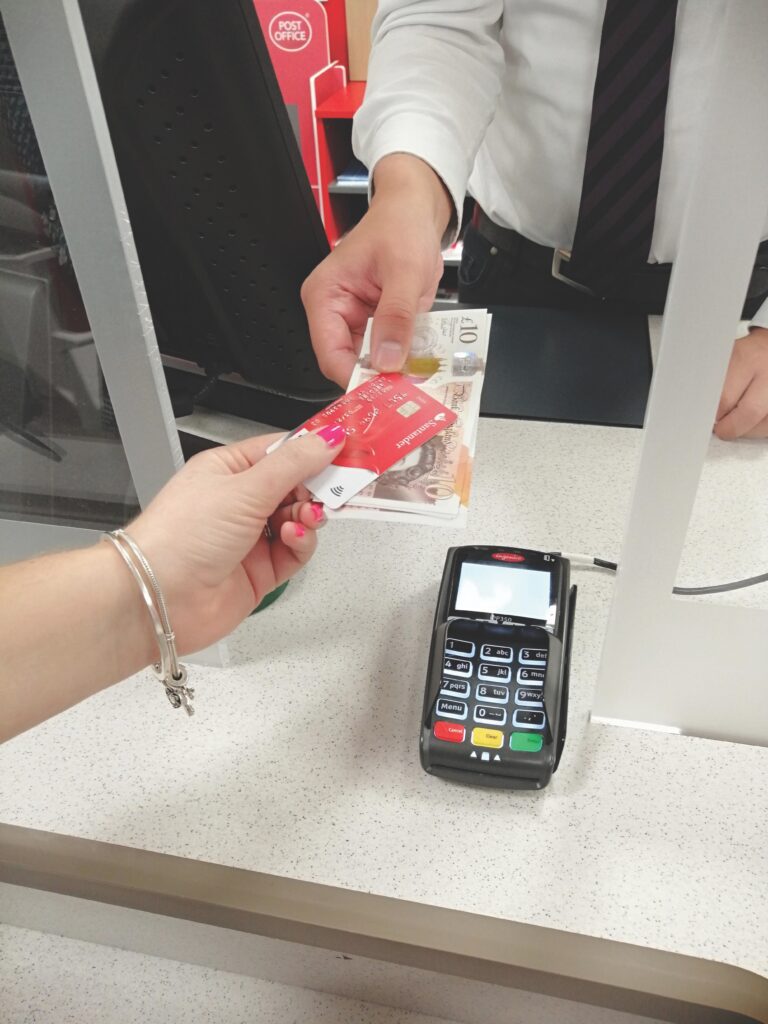Allied Irish Banks (AIB) announced in July 2021 that it would close 15 bank branches in the Republic of Ireland by the end of the year – leaving a network of 170 remaining branches. Though the bank cited a 30% decrease in daily branch visits from 2019 to 2021, it experienced a public uproar over the announcement’s 8.11% decrease in branches. Regional access to cash services was argued to be vital to the vulnerable, the elderly and those on lower fixed incomes in local communities. After significant public and political pressure, AIB reversed its decision a year later: in July 2022, it announced that it would extend its everyday banking services at An Post’s post offices. This decision was partly because 540 of An Post’s post offices are situated in parts of the country that have no bank within a 5km radius.
Similarly, in the UK in 2021, banking association UK Finance found that despite cash payments being 35% below pre-Covid-19 levels and continuing to decline, millions of people still used cash daily. As a result of this trend, a landmark agreement between the major retail banks, consumer groups and the Post Office was reached in December 2021, in which the Post Office was enlisted to deliver new and improved, dedicated cash services in up to 30 Post Office branches. Following this, the Financial Services and Markets Act was granted royal assent on June 29, 2023, legally protecting free and easy access to cash. The primary intention of this initiative was also stated to be the support of UK consumers, particularly those in vulnerable groups.
An enviable position
In both instances, each company exploited its unique advantages as a postal operator to increase its share of the financial services market and reap the rewards. Ross Borkett, head of banking at Post Office, explains, “More than 5,500 bank branches have closed over the last five years, leaving a lot of customers needing cash services. We are really the only partner these banks could use to provide such services because we can provide such a robust operation.
“As a government-owned business, we are ruled by a set of criteria from the UK government that we must have 11,500 branches and be easily accessible to a certain number of UK citizens. For instance, 99.7% of the UK population live within three miles of a Post Office.
“We also operate all of our own cash infrastructure behind the scenes. There are vans all around the country picking up or dropping off cash. As a result, we are uniquely placed to offer a universal cash service with fantastic coverage that meet all the banks’ substantial needs. While the use of cash is in decline, I don’t see it going away any time soon and our market share has grown substantially. It’s a key pillar for our business now and for the next decade. This time will give us an opportunity to think about other financial services that we could provide in the future to support the banks and customers, as things develop.”
The company has capitalized on these in-built capabilities by bringing bank-grade automation equipment into its branches, implementing priority banking counters and launching Banking Hubs. A Post Office Banking Hub is a dedicated, shared banking space that brings community bankers, a universal cash counter and self-service banking together all under one roof.
Borkett explains, “In towns where banks are leaving customers behind, 10 or 11 banks come together to create, set up and operate out of the Banking Hub. So on a Monday, somebody from Lloyds comes in and works out of the private meeting space. On Tuesday, NatWest comes. On Wednesday it’s Barclays, and so on. These hubs are all paid for by the banks: they pay us and our postmasters to operate them and send their staff in on their relevant days. So far, seven are live right now, and another 50 have been announced. We anticipate that number will go up.”
Likewise, An Post already offers a comprehensive range of financial services under the An Post Money brand, such as current accounts, personal lending, credit cards and cash, card foreign exchange and other services such as BillPay and Western Union. When it announced the agreement with AIB in July 2022, An Post handled more than four million transactions a year through its post offices, with a value of over €1.3bn (US$1.4bn). By the end of 2022, that transactional volume had increased to 5.4 million a year with an increase in value to €2.1bn (US$2.3bn). This is in addition to its extensive branch network of circa 920 post offices nationwide. Its extended partnership with AIB is expected to further grow these services. According to An Post, it
is actively engaged with AIB to enhance and extend the current range of consumer and SME services, in particular.
Debbie Byrne, managing director of retail at An Post, commented at the announcement, “Our network of post offices is intrinsic to the financial and social fabric of Ireland. Never has the local post office been better placed as both a resource and a focus for renewal. The Irish Department of Finance is currently preparing a Head of Bill in terms of access to cash and undoubtedly An Post can fulfill the needs of banks, consumers, SMEs and government.
“An Post’s strategy is to provide a full product offering with highly competitive rates and innovative features, market leading in some instances such as on our credit cards and green loans, combining our unique human touch through our extensive branch network and the best online and digital experience, meeting the financial needs of local customers in their local communities.”
An Post credits its appeal to banks to its extended opening hours and Saturday openings across its national post office network. Due to its profitable partnership extension with AIB, the post will also invest further in the renewal and development of the post office network and the expansion of new services built around four key growth pillars – community banking for all, e-commerce enablement, a one-stop shop for government services, and other new services such as Leap Card top-ups, Green Hub and gifting. Its community banking for all initiative will include diversifying and growing financial service products for consumers and SMEs through An Post Money, Travel Money, partnerships with AIB and the Bank of Ireland and a range of State Savings products.
Studying the numbers
According to research from McKinsey’s travel, logistics and infrastructure practice, financial services account for around 20% of postal carriers’ total revenues on average, and for many, this share is growing. For the carriers that provide broad, mature financial services offerings – such as La Poste, New Zealand Post and Poste Italiane – this segment comprises 40-50% of total revenues. Furthermore, in McKinsey’s analysis of 54 markets around the world, it found that over half of all postal carriers are well positioned to enter the financial services market because, like the Post Office and An Post, they already have most of the necessary and expensive materials for the world of finance.
Eszter Beretzky, senior knowledge expert at McKinsey’s travel, logistics and infrastructure practice, comments, “Postal companies can offer customers a bevy of financial services by taking advantage of their vast branch networks, high foot traffic and close relationships with communities. Postal companies new to banking could look at a banking market’s size and profitability relative to that of the overall economy in a given country. Possible indicators of attractiveness include the banking sector’s return on equity, the market concentration of financial services and product penetration.”
When it comes to financial services opportunities, McKinsey’s research breaks postal operators into three tiers. The top category is ‘lands of opportunities’, followed by ‘selected chances’ and finally, the most challenging market, ‘pockets of growth’. This final category is characterized by complex markets where banking margins are compressed, or regions where wide variations in population density have led to an uneven distribution of branches. However, the consulting firm maintains that postal companies may still find pockets of growth where they can carve out spaces for themselves. So how might a postal operator succeed in an environment with such apparently limited financial services opportunities? The United Arab Emirates (UAE) is one such area in this tier – which is the domain of the Emirates Post Group (EPG).
The future of finance
EPG’s journey into financial services started 18 years ago with the purchase of a majority stake in licensed exchange house Wall Street Exchange in the UAE and money transfer operator Instant Cash in 2005. These companies were then completely acquired in 2012. This gave the company full control of its remittance services – a particularly impactful move given the UAE’s position as the second-largest market for outbound remittances in the world (after the USA).
Traditional financial services experienced a significant shift during the Covid-19 pandemic, as financial technology (FinTech) companies rushed to make services available to the population within the safety of their homes. In response, EPG created its FinTech arm, FINTX, in October 2022. FINTX was created to build an efficient FinTech ecosystem and provide a suitable setting for all types of financial technology services. This ecosystem is built on EPG’s existing financial services companies, which are undergoing major transformation and being reimagined from the ground up with technology in mind. It consists of a multitude of financial services for businesses and individuals, all provided under the FINTX umbrella. Once the transformation is complete, it will also provide a platform on which FINTX can create new ventures as well as providing industry incumbents and startups with the means to build their businesses.
Even at this early stage, the benefits of these financial investments for the postal operator seem clear, especially because the global FinTech market is predicted to grow at an annual rate of 11.9% between 2022 and 2027 to reach US$266.9bn by 2027.
Ahmed Al Awadi, managing director and CEO of EPG’s FINTX, says, “By identifying market opportunities and providing access to financial services, postal operators can increase their revenue and improve customer satisfaction. This can be achieved by leveraging their existing infrastructure and customer base to offer new and innovative financial services that meet the needs of their customers.”
Above everything, he highlights the overall importance of business diversification and keeping an eye on the big picture: “Exploring multiple revenue streams was key to remaining profitable. EPG encourages its portfolio of companies to not only provide services to postal customers but to the market as a whole, in the UAE and internationally (where opportunities arise).”
Borkett concurs on this business diversification point: “Clearly, cash services are something that our postmasters earn money from. However, our overall view is that it’s important to have a portfolio of different types of products because they all go through their own cycles. We had a few years where, for example, travel was very quiet but it has come back very strongly in the last 18 months. In the meantime, there has certainly been an increased interest in financial services both in person and online. Having a varied portfolio has given us a lot more resilience through these last few years than if we’d been just a mail business.”
For postal companies without such established positions within the market, McKinsey’s experts have a suggestion to help get their financial services off the ground. Ludwig Hausmann, senior partner at McKinsey’s travel, logistics and infrastructure practice, reports, “Young, affluent and digitally savvy customers may not be satisfied by the traditional banks’ customer experience, which they find inferior to the premium-like digital service they get in some other industries. Aspiring financial services providers should identify these customers and map their biggest underserved needs before setting out to craft relevant offerings. This way, organizations maximize the chances that early adopters will scale up demand during the critical initial stages of the launch.”
Borkett adds, “The biggest challenge is getting the cut-through of awareness. This means that despite all the efforts we might make around marketing, unless you are actually looking for cash, we’ll struggle to cut through the noise. Instead, we focus on certain trigger events, such as a bank closing or a local banking hub opening. That is a good opportunity to talk to people about the types of services we offer. A lot of our awareness is driven by local campaigns and interaction, by literally going into your shops on your high street and saying, ‘Did you know…?’.”
Read the latest issue of Parcel and Postal Technology International here.





